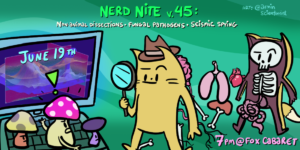As the Earth nears its complete tilt towards the Sun, we are also halfway through what has quickly become Nerd Nite’s biggest year in Vancouver. We can’t thank you enough for helping us grow this community of adult learning, and we’ll be announcing our fun new summer movie series very soon, but for now we have some important nerding to do. June 19th is not only the anniversary of the first woman in space, Valentina Tereshkova, but also it’s National Cocktail day. In 1806 the very first definition read as follows “Cock-tail is a stimulating liquor, composed of spirits of any kind, sugar, water, and bitters—it is vulgarly called bittered sling, and is supposed to be an excellent electioneering potion, in as much as it renders the heart stout and bold, at the same time that it fuddles the head.”
Let’s fuddle the head with knowledge and potions!
When: Wednesday June 19th; Doors @ 7, show starts @ 7:30
Hosted by: Kaylee Byers and Michael Unger
DJ Bürger – Grant Francis Minor
Poster: Armin Mortazavi
IG: @armin.scientoonist

1. Non-Animal Dissections
Dr. Elisabeth Ormandy
Bio: Dr. Elisabeth Ormandy is a former neuroscientist who has spent her career getting to know animals better, on their terms. After retraining in animal behaviour, welfare, and ethics she now uses her science savvy to advocate for the advancement of science without suffering. Elisabeth is co-founder and executive director of the Animals in Science Policy Institute (AiSPI), a Vancouver-based national charity. She is an instructor at the University of British Columbia, an Advisor to both the Canadian Centre for Alternatives to Animal Methods, and the Humane Education Coalition. She is part of the editorial team for the Alternatives to Laboratory Animals journal, and also gives national policy advice to the Canadian Council on Animal Care on a regular basis.
2. The Potential Perils of Brain Eating Fungi!
Linda Horianopulos
From leaf litter on the forest floor, to the sugars in human brains, fungi can feed on all sorts of things. The brain eating fungi have particularly intrigued researchers, leading them to speculate about the possibility of “zombie fungi”. In fact, in the insect world, it is well documented that fungi including Cordyceps infect insect hosts and control their behaviour to increase the spread of the fungal pathogens. But could they affect people in the same way? The human fungal pathogen Cryptococcus neoformans disseminates throughout the body and grows well in the brain where it finds and feeds on one of its favourite sugars. We’ll explore the world of brain eating fungi and speculate on whether a human mind control fungus could reasonably evolve.
Bio: Linda is a PhD candidate with a fascination for fungi! Mushrooms are cool, but the underappreciated fungal pathogens are what really get her excited. She keeps a ukulele in the lab to pass the time and a soccer ball under her desk to hone her foot skills, after all it’s all about work-life balance, right?
3. Seismic Spying: You Can’t Keep Secrets from Rocks
Mika McKinnon
Seismology isn’t just for earthquakes. Geophysicists use seismic signals to spy on everything from bomb tests and traffic jams to crashing waves and lover’s lanes. A signal is just the noise you’re looking for, and our planet is humming in its eagerness to spill subsurface secrets.
Bio: Mika McKinnon is a geophysicist, disaster researcher, and scifi scientist. As your friendly neighbourhood geoscientist, when she’s not creeping on seismic signals, she offers tasting notes on rocks, tweaks party planning to enhance disaster preparedness, and obsesses over impending doom. McKinnon scrawls equations and establishes plausibility for shows including Stargate, Star Trek, and [redacted]. Her writing appears in Wired, io9, Vox, and more. She shares her press passes (and social media) with a bevy of mischievous plush creatures.